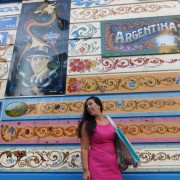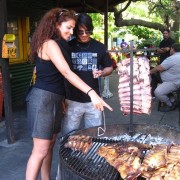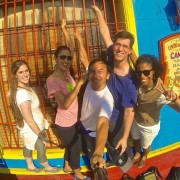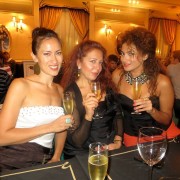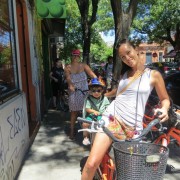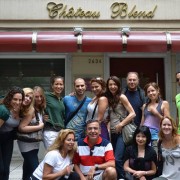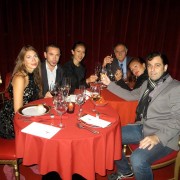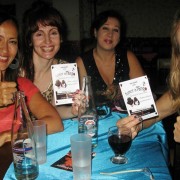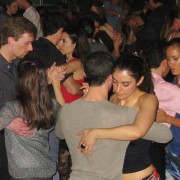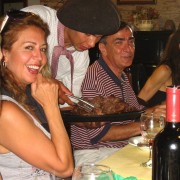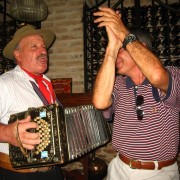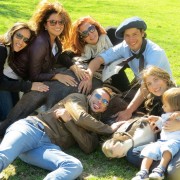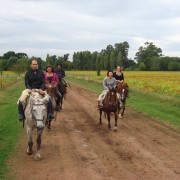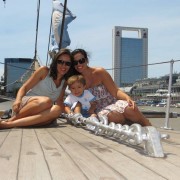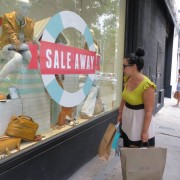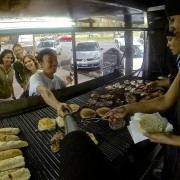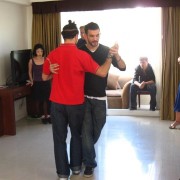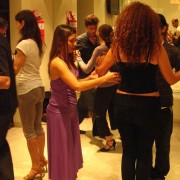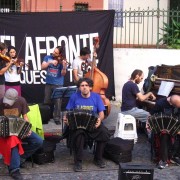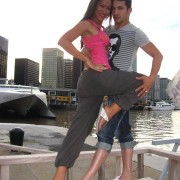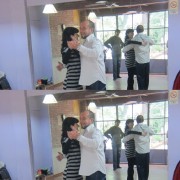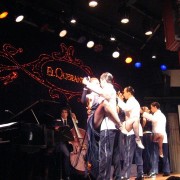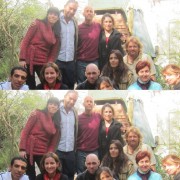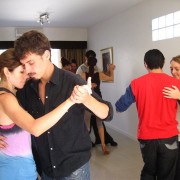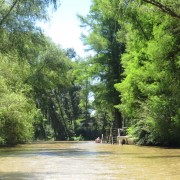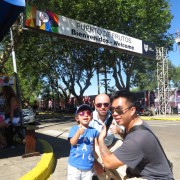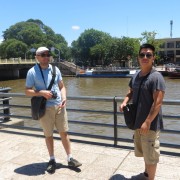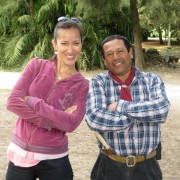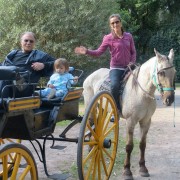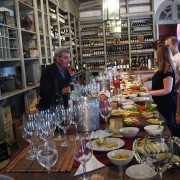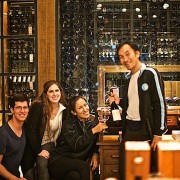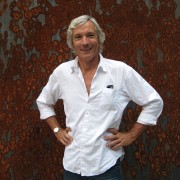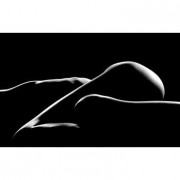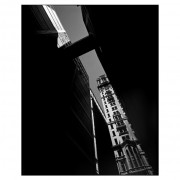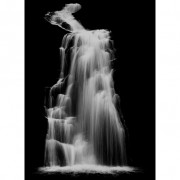Please introduce yourself.
My name is Johanna DALEZ, I’m French with Chinese and Finnish origins (I do speak fluently Finnish, but can’t say a single word of Chinese!). Since an early age, my entire childhood was spent moving from one country to another (my father was a diplomat at the French Embassy), instilling in me a natural passion for travel and cultural curiosity. After International Business, I pursued studies in Tourism and Hospitality in Montreal (where I lived 8 years), and then went on to expand professional skills in various industries. It took no time to establish that the travel industry is where I’m at my best. A six-year stint in Dubai working in events and incentives, and providing the highest standard of service to clients, was the perfect launching pad for my present venture.
Indeed, after meeting the father of my son, an Argentine tango maestro, I decided to move to Buenos Aires where I have been living since the end of 2009. After a couple of years adjusting to my new home and enjoying my other passion, Tango, I decided to start my own business as a freelance Travel guide. My enthusiasm on guiding guests along destinations that stand apart from standard tourist itineraries will delight and offer everlasting memories. I believe that the essence of a trip is best captured through encounters with the local people, culture and art.
Most of the vacation packages I offer combine tango dancing (both beginner and advanced dancers) with sightseeing of the city, as well as wine tasting tours with gourmet restaurants for those that are more culinary inclined. I of course also provide custom-designed packages for those that have specific interests in mind when travelling to Argentina.
How did you end up in Buenos Aires…why not in France or Finland?
I was born in Paris, but started travelling with my parents to all kind of exotic destinations since the age of 3. My mom raised 4 children (me and 3 younger brothers)and always spoke to us Finnish. We used to spend our summer vacation in Finland every year, but I never lived there.
After getting my degree in International Business in France, I moved to Montreal where I ended up staying for 8 years. Since then, France has only become a destination where I return for holidays once a year to see my family and friends. When I got tired of the long and freezing Montreal winters, I got the opportunity to move to Dubai where I lived for almost 6 years. That city allowed me to bloom professionally and give me the necessary experience to be where I am today.
An Argentinean man is the reason I moved to Buenos Aires, but also my fascination for the South American culture (I also lived in Colombia for 3 years during the years I travelled with my parents). Now that my son was born here, I have decided to make this place a permanent one, or at least until he turns 18 !
What is the best and worst about Buenos Aires for you … what is a typical day and weekend?
Buenos Aires is a city of contrasts, but overall it is a very charming city. I like it for several reasons:
– Traditional values. For example, knowing your neighbors, knowing your local store owners, or courtesy towards pregnant women or elders in public transportations.
– Lots of green parks in the city and a huge variety of trees, people usually gather for picnics or to drink ‘mate’ in parks every weekend.
– The European feel of the city in some neighborhoods (lots of French style architecture in Recoleta for example). You can see it is a city that has a lot to tell and there are plenty of opportunities to join different types of city tours (walking, biking or by bus) to find out about the extended history of Buenos Aires.
– Lots of free cultural activities and events organized in different parts of the city at all times
– Tango, wine and bife de lomo! There are places to go dance every night of the week and amazing Malbecs and bife de lomos to be enjoyed at very cheap prices!
What I don’t like about Buenos Aires:
– Insecurity
– The crazy way people drive here. Buses and taxis are the worst, in most cases, they have absolutely no respect for other drivers’ safety or their own passengers.
– Broken sidewalks and dog poop everywhere !
– The swearing ! I have never heard people swear as much as in Buenos Aires, but I guess it’s part of their eccentricity!
– The summer heat… it becomes very hot and humid during January and February, with temperatures reaching 40C !
How do you find the lifestyle in Buenos Aires compared to Europe: such as housing, food, health care, education..?
Very different.
Supermarkets don’t have as much choice as in Europe. Many of the imported goods are very expensive or simply non-existant. There are of course local products available but the choice is quite limited and the quality not as good. I also notice that Argentineans love sugary products. For example most of the yogurts are sweetened, it is sometimes hard to find a supermarket that sells natural yogurt without any sugar added. Same goes for grinded coffee, it comes already mixed with sugar ! And I read somewhere that Argentina is the highest consumer in the world per capita of CocaCola !! I always want to scream when I see parents giving CocaCola to very young children, as if it were water!!
Healthcare is free in Argentina, but public hospitals are always overcrowded and getting doctors appointments can take a long time. That’s why most expats take private healthcare which is relatively expensive if you earn your living in pesos (it’s currently close to 1000 pesos per month for a good healthcare plan). It is of course a lot cheaper than private healthcare in the USA, so everything is relative depending where you are originally from.
Education is also free in Argentina, but public schools are generally not an option for expats. In my case, I will be enrolling my 3 year old son to French school next year, and although school fees are very expensive, being a French citizen, he has the chance of benefiting of a scholarship from the French government. I am very grateful that France promotes education to all its citizens, even those living abroad, as it is very important to me that my son gets a European education. Having Finnish origins as well, I also take him to “Suomi koulu” that is organized by the small Finnish community of Buenos Aires. It is a bi-monthly gathering either at someone’s house or at the Nordic church, where kids get to do all sorts of activities with their Finnish teacher while parents chit-chat in another room. Although I never speak to my son in Finnish (as I don’t want to mix 2 languages, French being my mother tongue), I would still like him to be initiated to Finnish as his grandmother is from Finland (Oulu) and he also has 5 cousins that are half French and half Finnish.
How do you make your living now – and how would you like to develop that career?
I am self employed and I work from home. Finding a decent job in Buenos Aires is difficult because companies will always favor a native over an expat. Furthermore, salaries are quite low even for those holding high positions. When I first arrived to Argentina, I was working for a local DMC (Destination Management Company). I ended up resigning after 3 months, because my salary was a misery and I was not able to close my month with it. I then decided to start working as a freelancer, which turned out to be much more rewarding financially and personally!
I organize vacation packages for people travelling to Buenos Aires individually or in small groups. Most of the guests that I receive are tango dancers from around the world or wine-tasting enthusiasts.
In my tango vacation packages I offer tango classes every day with renowned Argentinean tango maestros, milongas every night, meals in my favorite restaurants, and all sorts of fun activities during the day to get to know the city as authentically as possible. I accompany my guests at all times to ensure they return back home with their heads filled with great memories!
Since Argentina is also very famous for its wines, a group of wine connoisseurs are coming here in February from Finland accompanied by a famous Finnish sommelier called Antti Uusitalo. I will be taking them around Buenos Aires, Colonia (Uruguay) and Mendoza for different wine tastings in renowned wineries. This will definitely be a very tasty trip both for the group and myself!!
Finns love tango – what is the difference compared to Argentinean tango?
Honestly speaking, I don’t know much about Finnish tango. I just know that it’s a lot more simple than Argentine tango. I’ve never danced Finnish tango, but only seen it on a few occasions. I am actually planning to watch a documentary called “Tango de una noche de verano” that seeks to find out whether tango is originally Finnish or Argentinean. The answer to this question maybe hides in that movie ?
You see many tourists. Do you see the differences between nationalities guessing where someone is from – maybe I am just wrong when I feel you’d notice that in tourists’ behavior?
Usually when people come here for vacation, they are all very happy and eager to discover the city, its people and its customs. I’ve had European, Middle Eastern and Asian guests with me, and all of them have their own behavior as unique individuals. They however have all followed my advise on not attracting too much attention on them, simply to avoid pick-pocketing or petty theft. I’ve noticed that Asians are the most timid and introvert, but the fact that I am accompanying them most of the time during their vacation, allows them understand this culture much more easily than if they had been on their own. Europeans and Middle Easterns on the other hand, have had no problem strolling the city at ease on their own during their free time.
What is the essence of Buenos Aires to you – what do you absolutely want your friends to see or feel in Buenos Aires?
The essence of Buenos Aires to me is the diversity and history that can be found in different areas of the city, as well as the customs of Argentineans. Whether you find yourself in Puerto Madero or San Telmo, you will see 2 different worlds. I want my guests to see the harsh realities of Buenos Aires, not only the clean and charming places. Extreme poverty lives side by side with rich neighborhoods such as Recoleta. On Avenida 9 de Julio, only a railroad separates the rich side of the city to one of the biggest ‘villa miseria’ (slum) of Buenos Aires. The contrast between rich and poor is heartbreaking, but I believe that it’s a reality that I need to show foreigners that come here.
I also want them to experience Argentine customs, such as having dinner around 10:30pm at night before heading to a milonga! People eat very late in this country, which can sometimes be a bit difficult for Finnish people that usually dine around 6-7pm. But as the saying goes: “When in Rome, do as Romans do”!
What do you absolutely miss from France or Finland…or elsewhere?
Aside from obviously missing my family and friends, I miss the food !!! Cheeses, pastries and chocolate from France and Salmiakki, Ruisleipä and Karjalanpiirakka from Finland !!!
Well organized society and punctual public transportation is also something I miss, as well a clean side-walks where you do not need to slalom to avoid dog poo…
How do you balance your career with other obligations – mate, children, job?
Being able to work from home has been the biggest blessing, as it has enabled me to raise my son on a full time basis (I’m a single mom). The times I’ve needed a babysitter, the family from his father’s side has always given me a helping hand with a lot of pleasure. On many occasions, I have even presented my son to my visiting guests, and it has not been a problem for anyone to have him around. He behaves very well and adapts to stranger very quickly.
What do you think about the economy and how safe it feels in Argentina?
The economy is quite bad in Argentina. Too much bureaucracy, corruption and complicated laws make it very hard to have a business here. Many foreigners are moving their business elsewhere, or simply closing down. Safety wise, I never take useless risks when travelling in the city. I know quite a few cases of people being robbed or pick-pocketed, but I touch wood, as I have not experienced any similar situation. I just take the necessary precautions to avoid attracting attention. Buenos Aires is a big city, and lots of tourists visit it every year without any problem. There is no reason to be scared to come, but there are plenty of reasons to be cautious when wandering in the city.
Do you try to go back to Europe every year? Argentina must be quite different compared to Europe despite Spanish language . I think the cultures are different. What do you miss the most – and the least.
Yes, I go back to France and Finland every year, as I want my son to know and not forget my side of the family. I also need that “bowl of fresh air” where I can enjoy European mentality and habits, spend quality time with my family and friends, eat all the food that I cannot get in Buenos Aires, take pleasure in admiring French and Finnish sceneries, and getting back in touch with my roots. Usually when I’m in Europe vacationing, there is nothing that I do not miss !!!
Workwise – how do you see Europeans being different from Argentinians– also culturally, what stands out in your chosen profession?
Customer service in Europe is amazing compared to customer service in Buenos Aires!! Work ethics are different, and on several occasions I have felt that Argentineans lack professionalism. This is a reason why I make sure that my guests receive top notch service from me, as I see it as my # 1 priority in what I do. High standard customer service is something I learned very well in Dubai, but it also comes very naturally from me, as I enjoy spending time with my visitors and making sure they are happy at all times.
When you think about what did you think about life in BA before you moved there – did you misconceptions that turned out to be wrong?
Yes, I thought that life was going to be easier for me. On a personal and professional level, I find that it has been harder than expected to blend into Argentina’s life. I guess living in Europe, Canada and Dubai always was the standards of living I was used to, but coming to Buenos Aires meant a whole lot of readjusting from me. Today I am happy to be here, but I have to admit that there were times I was thinking about giving up and leaving.
What cafes or restaurants do you recommend to tourists to go to..and tango places?
I usually take clients to famous cafés such as Tortoni or La Biela, as for restaurants I try to offer them a selection of different cuisines so that they don’t get saturated with asados ! Guests who don’t dance tango, usually like going to tango dinner shows such as El Querandi or Carlos Gardel. But for those who come here to learn tango, I take them to a different milonga every night of the week.
How do you think the cosmetic surgery is so dominant in BA – why is that?
I have no clue how to answer this question. It’s a topic I’m not familiar with. All I can say is that Argentine women take good care of themselves, and those who can afford it, cosmetic surgery is something very common. Breast and nose surgeries are the ones that you can usually see among the female population (all ages) but more than this, I don’t know anything about prices nor surgeons.
Anything else you would like sharing with us?
Thanks for giving me the opportunity to express myself – and promote my business.
I hope that whoever wants to visit Argentina (either alone or with a group) will not hesitate to get in touch with me, as I will be more than happy to assist in any kind of way.
Connect with Johanna:
tangoexperience@hotmail.com
www.facebook.com/TangoExperience

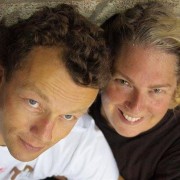
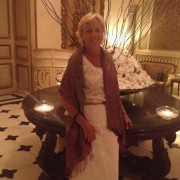
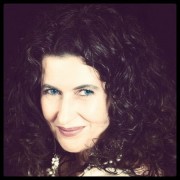
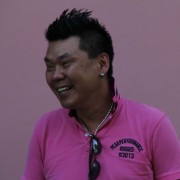
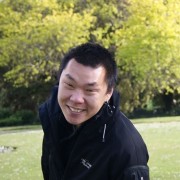
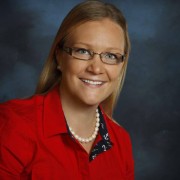
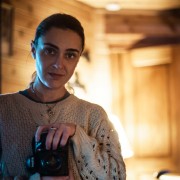
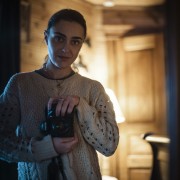

 Watch the short video below that Kambiz (a refugee himself) and Angela-Jo – the Chair, Commission on Immigration Affairs, put together for us.
Watch the short video below that Kambiz (a refugee himself) and Angela-Jo – the Chair, Commission on Immigration Affairs, put together for us.
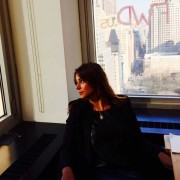
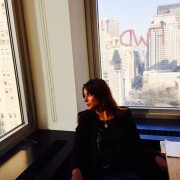
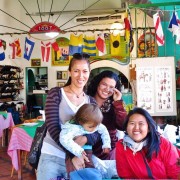
 Johanna Dalez – A Parisian/Finnish Lady in Travel Business in Buenos Aires
Johanna Dalez – A Parisian/Finnish Lady in Travel Business in Buenos Aires